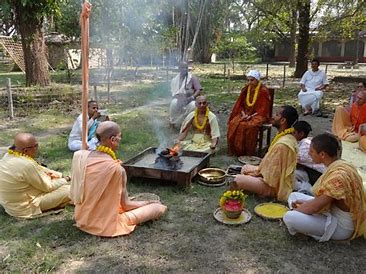The Vānaprastha Adventure, Installment 19

Here we continue our list of no-risk practical items that vānaprasthas or aspiring vānaprasthas can adopt.
Perform a ceremony to solidify your determination
As far as I know, the śāstras don’t mention any ceremony for adopting the vānaprastha āśrama. No ceremony is required. Nonetheless, in some cultures it is common to perform a yajña or similar ritual before all sorts of undertakings—starting a business, for example. In such ceremonies, one expresses one’s determination and seeks blessings from God and saintly persons. So one might similarly perform a simple yajña to signify the start of one’s vānaprastha life. Such a ceremony can help solidify one’s own sense of purpose and make known to others one’s change of āśrama.1
I’ve never seen the śāstras mention any such thing as a “vānaprastha guru.”
Change your name
As a sign of one’s change of āśrama, one may change one’s name from “Dāsa Adhikārī” to “Dāsa Vanacārī” or “Dāsa Gauravanacārī.” Janānanda Dāsa (now Goswami) wrote in his Vānaprastha Ashram, “On enquiry from the Gaudiya Matha, vanaprastha means retiring to the forest of either Vrndavana or Mayapura. If Vrndavana then the title Vanacari is used, if Mayapura then Gauravanacari.” There seem to be no hard-and-fast rules about this, he writes. “It depends where one’s sentiment lies.”2
Trim your hair
Hair forms a part of our material “identity kit.” If we’re detaching ourselves from our material identity, we can clip the hair. And if we’re no longer working, why not shave it off? That goes for facial hair too. We may recall that when Sanātana Gosvāmī, after traveling through the jungle, met Lord Caitanya Mahāprabhu at Vārāṇasī, the Lord asked him to get shaved and had him “look like a gentleman.”3 Commenting on this incident, Śrīla Prabhupāda said, “That means Caitanya Mahāprabhu does not approve of these beards and mustaches. Therefore we keep our students clean-shaven.”4 Absent reasons to the contrary, Śrīla Prabhupāda wanted his male disciples to live shaven-headed.5
Change the color of your cloth
If you wish, you can change the color of your cloth. A vānaprastha may wear white, or, Janānanda Goswami writes, one may wear yellow, since yellow signifies that one is undergoing a particular vow. This can help send a message to people: “I’m not a gṛhastha anymore. I’ve changed. My life is not meant for what it used to be meant for. I’ve moved on. So if I turn down your social invitation, please understand: It’s because I’m a vānaprastha.” And the new color may also remind us what to do.
In the Bhāgavatam (7.12.21) it is said that a vānaprastha should wear “garments colored like fire.” But in today’s context saffron would seem appropriate only if the wife is fully out of the picture—deceased or long gone.
Śrīla Prabhupāda as a vānaprastha wore white.6
As for women, I know of no sastric guidelines about color. But “[i]n all cases,” Janānanda Goswami writes, “simplicity would be the order.”
Whatever color we wear, dress is less important than consciousness. The Bhāgavatam says that in Kali-yuga liṅgam evāśrama-khyātāv anyonyāpatti-kāraṇam: “A person’s āśrama will be ascertained merely by external symbols. And merely by changing such symbols will people change from one āśrama to the next.”7 To factually adopt the vānaprastha order, we should change not merely our appearance but our consciousness.
Simplify your dress
We may not dress in tree bark, but we can dress simply and get rid of what we don’t need (we don’t need much). If our wardrobe has clothing we don’t need, that’s clothing we can sell, hand down to others, or otherwise give away. The more we ccan lighten our load, the better.
Shun gramya-katha
In The Nectar of Instruction (verse 2) Śrīla Rūpa Gosvāmī warns that we can ruin our progress in Kṛṣṇa consciousness by prajalpa, “talking unnecessarily about mundane subject matters.” Such talk is also known as grāmya kathā.
Śrīla Bhaktivinoda Ṭhākura has therefore sung, tyaja grāmya-kathā-sakalaṁ viphalaṁ: “Just give up all grāmya kathā. It is useless.”8
Śrī Caitanya Mahāprabhu instructed Raghunātha Dāsa Gosvāmī, grāmya-kathā nā śunibe, grāmya-vārtā nā kahibe: “Do not talk like people in general or listen to what they say.”9 And Raghunātha Dāsa Gosvāmī himself later wrote, asad-vārtā-veśyā visṛja mati-sarvasva-hariṇīḥ: “O mind! Reject the prostitute of useless mundane talk, who steals one’s intelligence.”10
Mundane talk simply draws our attention to topics for material enjoyment, and these topics suck up our time and thought. As Sanat-kumāra told Mahārāja Pṛthu:
indriyair viṣayākṛṣṭair
ākṣiptaṁ dhyāyatāṁ manaḥ
cetanāṁ harate buddheḥ
stambas toyam iva hradāt
“When one’s mind and senses are attracted to sense objects for enjoyment, the mind becomes agitated. As a result of continually thinking of sense objects, one’s real consciousness almost becomes lost, like the water in a lake that is gradually sucked up by the big grass straws on its bank.”11
Commenting on prajalpa in The Nectar of Instruction, Śrīla Prabhupāda writes, “When we mix with a few friends, we immediately begin unnecessary talking, sounding just like croaking toads.12 If we must talk, we should talk about the Kṛṣṇa consciousness movement. Those outside of the Kṛṣṇa consciousness movement are interested in reading heaps of newspapers, magazines and novels, solving crossword puzzles and doing many other nonsensical things. In this fashion people simply waste their valuable time and energy. In the Western countries old men, retired from active life, play cards, fish, watch television and debate about useless socio-political schemes. All these and other frivolous activities are included in the prajalpa category. Intelligent persons interested in Kṛṣṇa consciousness should never take part in such activities.”
So we should hear and speak about Kṛṣṇa, avoid the distractions of grāmya-kathā, and, unlike retired materialists, avoid the “other frivolous activities” Śrīla Prabhupāda identifies as prajalpa.
Here are some practical steps.

1) Cancel your newspaper and magazine subscriptions, whether physical or digital. You don’t need them.
2) Clear your shelves of needless mundane books. They clutter what should be a place of spiritual culture, and they invite distraction.
3) Ditch your television. Why should this thing occupy a central place in our home or our lives? Cancel your cable subscription. Consider giving the set away. Then do it.
All right, if you use your television exclusively for viewing Krishna conscious lectures, kīrtanas, and so on, it may be helpful. But if the device we say we were using for Kṛṣṇa become s the gateway for news, sports, distractions, and time-wasting, ditching it may be the best way to go.
4) Limit your computer time.
For all the convenience and help computers provide, they also provide distraction, agitation, obsessiveness, and entanglement. If you have no need of a computer, then live without one and be happy. Otherwise, take steps to keep your computer from stealing your time and thoughts.
Keep your computer off in the morning until you’ve completed your sādhana. Let that time be entirely for hearing and chanting and direct devotional activities. On occasion you may have some compelling reason for your computer to be on. Otherwise: Off.
During your sādhana time, you may also find it helpful to keep your computer in a different room.
If you can reserve sādhana time in the evening the same way, so much the better.
When you limit your computer time, life will still go on well enough. People will get to know when you’re offline, and they’ll adjust.
You can set your browser to open to a page that’s blank or has nothing but a search box instead of a news page. For all the major web browsers there are free extensions that enable you to block particular sites, or the whole web, at times you specify. You know what sites you waste time with, and when. So you can use an extension to fight back.
5) Get rid of computer games (and non-computer games as well).
6) Limit your use of the phone. Again, keep it off during your sādhana time—preferably even in another room. When it’s on, turn off needless notifications. If you have apps you can do without, uninstall them. Delete all games. Cancel mundane subscriptions. Consider replacing some apps with pen and paper. Don’t waste time with idle messages and talk. As far as possible, stay offline.
7) Consider withdrawing from social media. Yes, it can be used for Kṛṣṇa. But it can also waste huge chunks of time, fill our heads with junk, and draw us into pointless, foolish battles and Vaiṣṇava aparādhas. Social media companies employ skilled professionals to devise ways to keep us busy on their “platforms” as long as possible. Reclaim your time from social media and invest it wisely in the real world of direct devotional service.
These tips for technology will of course go out of date. As machines and gadgets change, so will the way we use them (or they use us).
But this doesn’t change: If we want to avoid grāmya-kathā, we should hear and speak more about Kṛṣṇa. Śṛnvatām sva-kathāḥ kṛṣṇaḥ.13 Nature abhors a vacuum. So if we want to shun grāmya-kathā, we need to replace it with something better, and the best topics are those concerning Kṛṣṇa.
Notes:
1 In 2016, I performed such a ceremony for one vānaprastha couple, Jaya Gaurasundara Dāsa and Kaumodakī Devī Dāsī.
2 I have not heard anything about a change of name for women.
3 Cc. Madhya 20.68‒70.
4 Lecture on Bhāgavatam 7.9.10, Calcutta, 1971. The VedaBase doesn’t give the full date.
5 Expressing dissatisfaction at seeing disciples with heads of hair, Śrīla Prabhupāda said in a lecture in Vṛndāvana on November 25, 1976, “So we should be known as shaven-headed, not long-hair-headed. This is discrepancy. At least once in a month you must be clearly shaven-headed. In the bright fortnight on the day of pūrṇimā, four days after ekādaśī, once in a month in the bright fortnight, you must be shaved.” In fact, Śrīla Prabhupāda said that because his disciples were too old to chastise, he was submitting this instruction to them as a request “with folded hands.” The day after this lecture, Hari Śauri Dāsa, Śrīla Prabhupāda’s personal servant, sent a letter to Rameśvara Swami quoting this instruction (at greater length) and saying that Śrīla Prabhupāda had requested that the instruction be sent to all temples and GBC members. Śrīla Prabhupāda countersigned the letter. “Approved: A. C. Bhaktivedanta Swami.”
For women, Śrīla Prabhupāda wrote, shaving of the head is appropriate only for widows (Letter to Himavati, 15 June 1972). In particular circumstances, a woman may live “like a widow” (Letter to Govinda Dāsī, April 30, 1974).
6 ŚrīlaPrabhupāda–līlāmrta, Vol 1, Chapter 7.
7 Bhāgavatam 12.2.4.
8 Śrī Godruma-Candra-Bhajana-Upadeśa, verse 2.
9 Cc. Antya 6.236.
10 Manaḥ-śikśā, text 4.
11 Bhāgavatam 4.22.30.
12 The Bhāgavatam (2.3.20) says that if we don’t hear and chant about Kṛṣṇa our ears are like snake holes and our tongues like the tongues of frogs. –js
13 Bhāgavatam 1.2.17.
This is part of a draft
This is an excerpt from a new book I have in the works—The Vānaprastha Adventure, a guide to retirement in spiritual life. While I’m working on it, I’ll be posting my draft here, in installments. I invite your comments, questions, and suggestions.

Leave a Reply